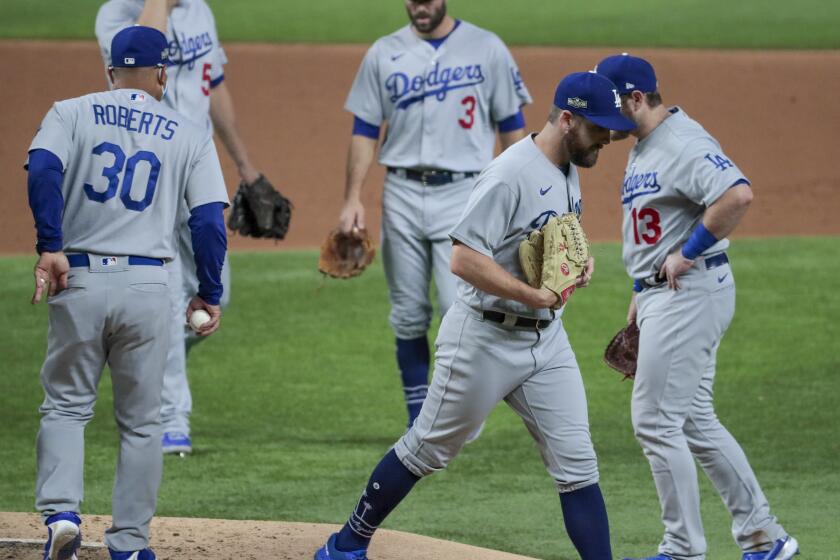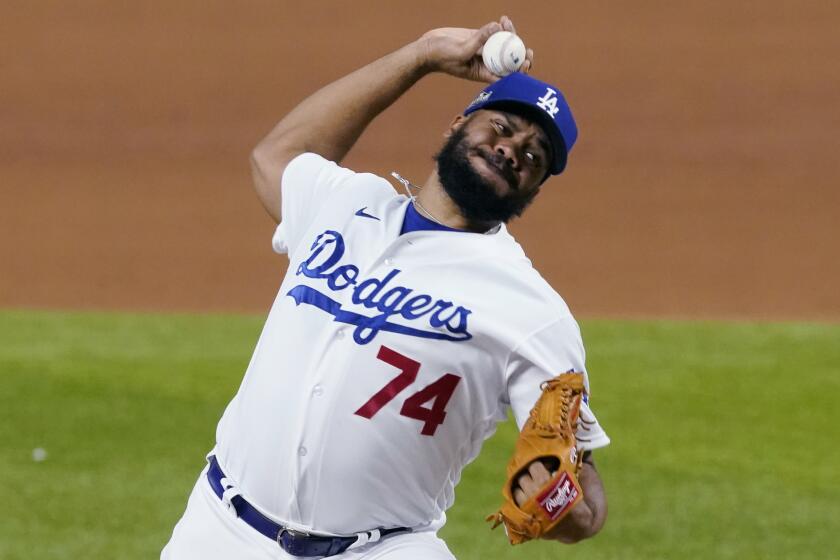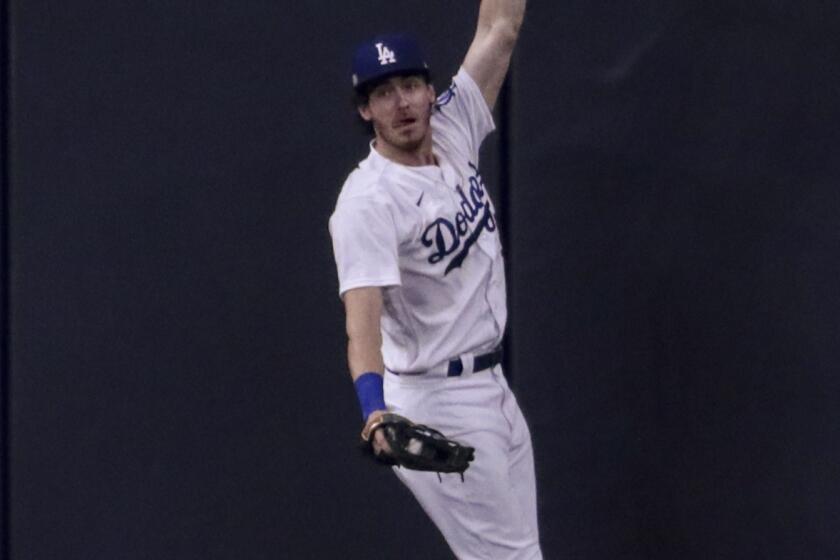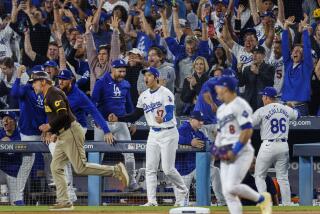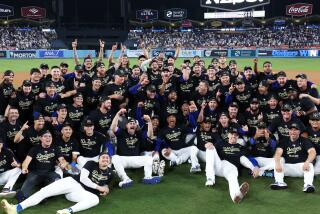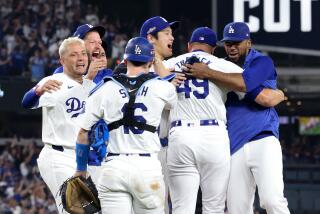Dodgers sweep Padres in NLDS behind stellar pitching and offense

ARLINGTON, Texas — The San Diego Padres, the upstart club oozing talent and swagger, were supposed to be the biggest challenge on the path to the World Series for the Dodgers. They were poised to prove they were championship contenders. But they were short-handed without their two best starting pitchers for the teams’ National League Division Series and the Dodgers showed no mercy.
The Dodgers steamrolled their budding NL West rivals 12-3 in Game 3 at Globe Life Field on Thursday to complete a three-game series sweep and keep their undefeated postseason record intact. They advanced to face the Atlanta Braves in the NL Championship Series. Game 1 is Monday, also at Globe Life Park but with fans in the stands for the first time in 2020. Los Angeles, the National League’s top seed, will be the home team riding an nine-game winning streak.
“When we win the day, it’s a good feeling, but we still know what’s in front of us,” Dodgers third baseman Justin Turner said. “We still know there’s a lot of work to be done.”
One of the looming questions for the Dodgers entering this series was this: Would they, after leading the majors with 118 home runs during the regular season, struggle to score in this home-run-depressing ballpark? This place plays big. The Dodgers saw firsthand when they visited in late August.
The Dodgers showed early on in Game 3 of the National League Division Series against the Padres that they were focused on pitcher-hitter matchups.
The answer was no. They slugged one homer in the three games but scored 23 runs anyway. They took their walks. They moved runners with singles the other way. They cracked doubles to the gaps. They lifted sacrifice flies, forced errors and even executed a crucial double-steal in Game 2. They manufactured runs by applying constant pressure. They adjusted their method of offensive destruction.
“That’s the name of the game right now,” Dodgers shortstop Corey Seager said, “putting pressure on people.”
On Thursday, the Dodgers compiled 14 hits and nine walks against 11 Padres pitchers — a record for a nine-inning postseason game. They scored runs in five innings. They broke the game open in the third when they tallied five two-out runs with four singles, a walk, an intentional walk, a steal and an error.
Will Smith went 5 for 6 with two doubles and three RBIs, setting a franchise record for hits in a postseason game after going 0 for 11 in the Dodgers’ first four postseason games. It was the first five-hit game by a catcher in MLB playoff history. Joc Pederson collected his first two hits and RBI of the playoffs. AJ Pollock had two hits. Mookie Betts smacked his fifth double in five postseason games. Cody Bellinger lined a two-run triple in the ninth inning for the finishing touches.
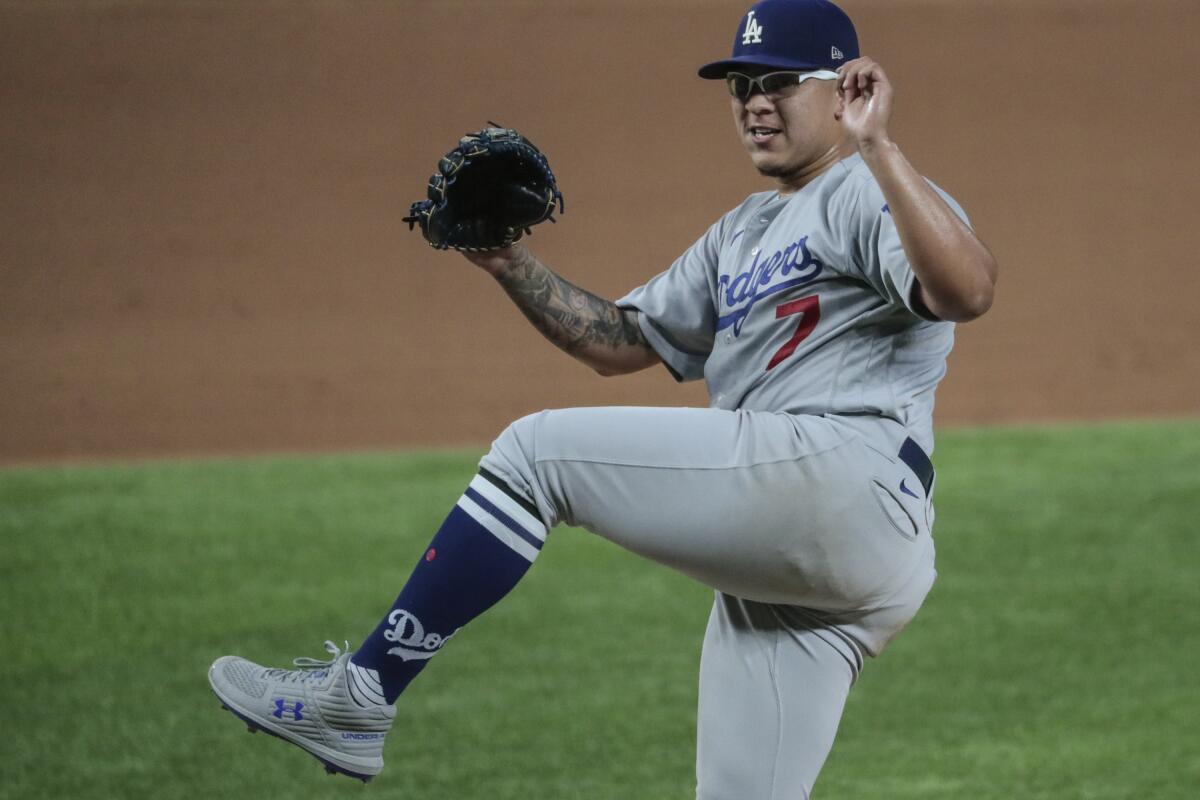
The Dodgers played their first game as the road team since they played in Colorado on Sept. 20. The switch didn’t change much from the previous two nights as the “hosts.”
They wore their road grays, took batting practice first, and hit in the top of the inning. Former Padres pitcher Randy Jones, the 1976 NL Cy Young Award winner, threw out the first pitch. … at Petco Park. The Padres had a former contestant on “America’s Got Talent” prerecord a rendition of the national anthem. A “Slam Diego” hype video was played.
Then the game proceeded with the same teams on the same field with the same few team employees and family members in the stands.
The Dodgers stampeded over the Padres in the National League Division Series, but Kenley Jansen and Joe Kelly haven’t been reliable late in games.
The Dodgers’ pitching plan got off to an alarming start. Dustin May, announced as the starter in the morning, walked Fernando Tatis Jr., but Tatis overslid second base attempting to steal and was tagged out. May then induced a flyout from Manny Machado to end the inning.
May threw 16 pitches. He didn’t throw another one. The Dodgers’ script called for May to face the top of the lineup — Tatis Jr. and Machado entered a combined 5 for 27 against him — before inserting left-hander Adam Kolarek to face Eric Hosmer, a left-handed hitter, to begin the second inning. Hosmer singled. Then Tommy Pham singled. The plan was crumbling.
Mitch Moreland grounded out next. The Dodgers, with first base open, opted to load the bases for Wil Myers. Kolarek was 3-1 against Jake Cronenworth when he threw a sinker that looked like a strike. But it was called a ball and Kolarek walked in a runner.

Highlights from the Dodgers’ 12-3 win over the Padres in Game 3 of the NLDS on Thursday.
Jason Castro hit into a fielder’s choice before Trent Grisham delivered an infield hit to plate another run and give San Diego a 2-1 lead. That coaxed Dodgers manager Dave Roberts to replace Kolarek with Julio Urías.
Urías, the Dodgers’ “bulk” pitcher for the night, stabilized the predetermined pitching blueprint. The left-hander retired the first 10 batters he faced.
The only damage San Diego inflicted came in the sixth inning after Machado singled and Hosmer reached on a two-base error by Pollock in left field. Machado then scored on a balk. He finished with six strikeouts and one walk in five innings before he was replaced by Blake Treinen.
“That was just a gutty, gutty outing by Julio,” Turner said. “And it doesn’t surprise us. He’s a bulldog out there.”
Clay Bellinger was by himself at Globe Life Field when he witnessed his son Cody Bellinger’s amazing catch against the Padres in Game 2 of the NLDS.
The Padres’ pitching strategy, one devised to overcome a depleted starting rotation, couldn’t rebound from the early collapse. Ideally, the Padres would’ve had Zach Davies start Game 3 after Mike Clevinger and Dinelson Lamet started the first two games. But Clevinger’s elbow injury flared up two pitches into the second inning of Game 1 and Lamet wasn’t on the roster because of a biceps injury.
While Dodgers had Urías, a starter all season, log the bulk of the innings, the Padres chose to open Game 3 with two innings from Adrian Morejón, a 21-year-old rookie, and rely on a stream of relievers for the final 21 outs.
San Diego successfully patched together the pitching in the wild card series but attempting to muzzle baseball’s top-scoring offense that way proved futile. The Dodgers were too good. Now they’re a step closer to the World Series.
More to Read
Are you a true-blue fan?
Get our Dodgers Dugout newsletter for insights, news and much more.
You may occasionally receive promotional content from the Los Angeles Times.

